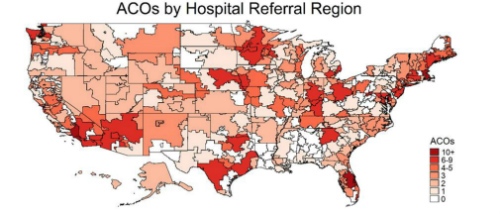- Accountable care organizations (ACOs) embody performance-based medicine.
- An ACO is a network of healthcare providers and hospitals that shares responsibility for providing all types of healthcare to ≥5000 Medicare beneficiaries at a period of at least three years.
- These providers and organizations must be able demonstrate that they can reduce costs while improving outcomes.
- Studies have shown that ACOs do effectively achieve these improved results.
While many healthcare professionals talk about accountable care organizations (ACOs), few can describe one in detail. Essentially, an ACO is a network of doctors and hospitals that shares responsibility for providing complete healthcare to no fewer than 5000 Medicare patients for a period of no less than 3 years.
This article is intended to offer insight into the basics of ACOs and to provide you extensive additional resources on this innovative type of healthcare organization that performance-based medicine at its heart.

According to the Centers for Medicare and Medicaid Services, “an accountable care organization (ACO) is a healthcare organization characterized by a payment and care delivery model that seeks to tie provider reimbursements to quality metrics and reductions in the total cost of care for an assigned population of patients. A group of coordinated healthcare providers forms an ACO, which then provides care to a group of patients.
“The ACO may use a range of payment models (capitation, fee-for-service with asymmetric or symmetric shared savings, etc.). The ACO is accountable to the patients and the third-party payer for the quality, appropriateness, and efficiency of the healthcare provided. An ACO is an organization of healthcare providers that agrees to be accountable for the quality, cost, and overall care of Medicare beneficiaries who are enrolled in the traditional fee-for-service program who are assigned to [the ACO].”
Who Benefits?
Are ACOs good for physicians? Are they good for patients? Can ACOs help to reduce overall U.S. healthcare expenditures? What does this shared responsibility actually look like and how does it work?
For those who believe in the ACO model, the answers are that ACOs are good for physicians and patients, and that the model has been shown to reduce costs. In fact, ACOs provide doctors and hospitals financial incentives to provide high quality care to Medicare beneficiaries while reducing costs, and evidence supports these views..
Improve Outcomes, Reduce Costs
In 2007, the Center for Medicare and Medicaid Services (CMS) announced the cost savings of the Pioneer ACO demonstration. According to a CMS press release, the cost of care for the nearly 670,000 Pioneer ACO beneficiaries grew by 0.3% in 2012. Costs for similar beneficiaries outside of the ACO grew by 0.8% in the same period, CMS asserted. CMS claimed that 13 of the 32 pioneer ACOs produced shared savings with CMS. Overall, the Pioneer ACO models earned an estimated $76 million by providing coordinated, quality care.
ACOs within the Affordable Care Act
The U.S. Department of Health and Human Services (DHHS) proposed the initial set of guidelines for establishment of ACOs under the Medicare Shared Savings Program (Section 3022 of the PPACA) on March 31, 2011. These guidelines stipulate the necessary steps that voluntary groups of physicians, hospitals and other health care providers must complete in order to partake in ACOs. Section 3022 of the Patient Protection and Affordable Care Act (ACA) authorizes Center for Medicare and Medicaid Services (CMS) to create the Medicare Shared Savings program (MSSP), which allows for the establishment of ACO contracts with Medicare by January 2012, according to a report by Kaiser Health News and, NPR.
According to the ACA, the MSSP “promotes accountability for a patient population and coordinates items and services under part A and B, and encourages investment in infrastructure and redesigned care processes for high quality and efficient service delivery.”
The existence of the Medicare Shared Savings Program ensures that ACOs are a permanent option under Medicare. However, the specifics of ACO contracts are left to the discretion of the Secretary of the Department of Health and Human Services, which allows the ACO design to evolve or devolve over time.
Look for additional articles in this series.
